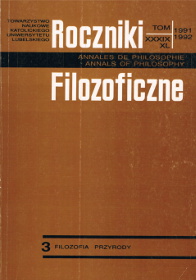Criteria of Cognitive Progress in Various Philosophies of Science
Abstract
The article consists of two parts, the first of which was published in "Roczniki Filozoficzne" 36-37:1989-1990 nr 3. The whole essay aims at exposing the current controversies on this topical issue, which we encounter in modern schools of metascience. They are mainly represented by the empiricist tradition, the Popperian standpoint, the post-positivist school and the so called synthetic point of view.
According to the logical empiricist image of science the assessment of scientific laws and theories is simply a matter of confrontation between them and the data. If the right kind and quantity of positive evidence can be collected, the theory is acceptable. If, on the other hand, the evidence is negative, then the proposed law or theory has to be rejected. Hence the label − monocriterial appraisal of scientific laws or theories. Science is also cumulative. Thus, through time, the scope of successful science becomes steadely wider, and nothing important is lost in the process.
Popper's attempts to provide the concept of cognitive progress include a conception of the conflict that arises in the case of successive scientific theories. His task is to show how one of such conflicting theories has an advantage over the other. Popper takes two factors into account. One concerns the issue of how close each of the false theories is to being true. But this alone is not a sufficient basis for a criterion of progress, for it implies that some relatively trivial generalization might be a progression beyond some comprehensive albeit refuted, theory. Consequently, a second factor must be considered, namely the comprehensiveness or non-triviality of a theory. This latter factor constitutes Popper's concept of content, and a combination of both factors gives his notion of verisimilitude. Explanation and prediction are other main dimensions of theory appraisal and preference. Popper's methodology is, therefore, fallibilist, objecitivistic, preferentionalist and evolutional.
During the 1960s and later a number of new theories of scientific change proliferated. The unit of comparative evaluation are large-scale theories (paradigms, research programmes, research traditions), on which different epistemic desiderata are imposed. On this occasion problems of teleological conception of science, questions of rationality and rationalism are discussed. The controversy between absolutism and relativism is also taken into account, as they are related to the status of desiderata. At the end of this part of our essay w e have a look at G. L. Pandit's interactive model of the growth of knowledge. In this model the dynamic interaction between developmental structures of problems and theories is a function of the explanatory power of a scientific theory (TEP) and the so called resolving power of a scientific theory (TRP). Both TEP and TRP serve as methodological bases of critical epistemic appraisals in empirical science.
Finally, the analyses of both the problem and various characteristics of scientific progress are followed by the considerations about epistemic and extraepistemic determinants of progressiveness in science. We recognize, in this way, the necessity of multidimensional appraisals. Nevertheless, it presupposes the technological and social progress. In each part of this paper the evaluational considerations are preceded by the descriptions of different approaches to the units of scientific achievements and logical relations between them.
Copyright (c) 1992 Roczniki Filozoficzne

This work is licensed under a Creative Commons Attribution-NonCommercial-NoDerivatives 4.0 International License.





